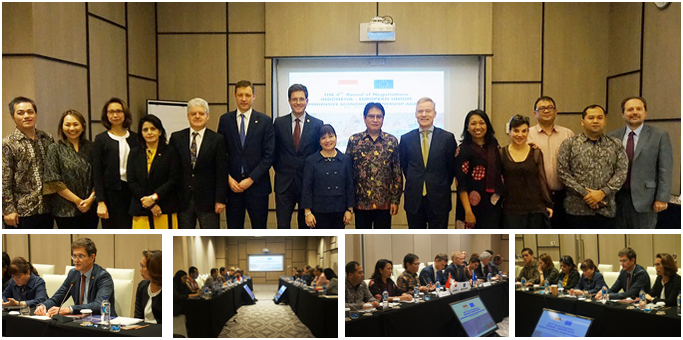Welcome
CEPA Negotiation: Positive Progress, Joint Conclusion Signed

Indonesia and the EU commenced the fourth round of the Indonesia-EU CEPA Negotiation Agreement (I-EU CEPA) in Surakarta, Central Java. The Indonesian delegation, led by Mr. Iman Pambagyo (Director General of International Trade, Ministry of Trade), informed that the discussion was entering the substantial stages for market access of goods and services. In addition, both negotiators informed that they aim to conclude this comprehensive and ambitious partnership that will mutually benefit the EU and Indonesia.
The negotiation was concluded by signing the Joint Conclusion of the 4th Round of Indonesia-European Union Comprehensive Economic Partnership Agreement (I-EU CEPA) between Mr. Iman Pambagyo and Mr. Filip Deraedt on Friday, 23 February 2018.
In between the negotiation process, EuroCham Indonesia was invited for an exclusive dialogue with Mr. Filip Deraedt, the EU Deputy Chief Negotiator and his team. In the meeting, EuroCham was represented by Mr. Wichard von Harrach, Head of EuroCham CEPA Task Force and EuroCham.
EuroCham Indonesia provided European business perspective on various issues including: Public Procurement, Competition Policy (including Subsidies and State-Owned Enterprises), Trade in Services, Investment, among others.
During the same period, EuroCham together with KADIN Indonesia had an opportunity to present our joint views to the EU and Indonesia Negotiators. The views were formulated in a CEPA joint recommendations paper that was highly appreciated by both negotiators. The document will continuously being updated to capture the most updated regulatory landscape in both areas.
In the meeting, EuroCham highlighted - especially in the light of the existing trade surplus of 4 billion USD - business aspirations for liberalization of investment regime, elimination of tariffs and reduction of import-restrictions and trade barriers.
EuroCham specifically focused on the importance of flexibility of movement of labor as regards to skilled workers that will enable transfer of know-how between the two economies. Mr. von Harrach further added that it is important to achieve as soon as possible a level playing field i.e. non-discriminatory treatment, alignment of standards.
Back